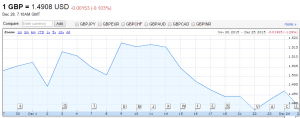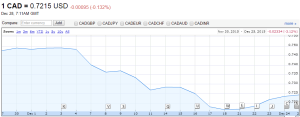You’d be a loonie to back the Canadian dollar; and the Sterling is less than sound as a pound!
Geopolitical events are notorious for having immediate and often dramatic effects on the values of sovereign currencies native to the host countries of such events, and as 2015 draws to a close, a pattern which was predicted by many FX companies and market analysts worldwide is becoming very clear. Japan’s Monex Group issued its predictions […]

Geopolitical events are notorious for having immediate and often dramatic effects on the values of sovereign currencies native to the host countries of such events, and as 2015 draws to a close, a pattern which was predicted by many FX companies and market analysts worldwide is becoming very clear.
Japan’s Monex Group issued its predictions some six months ago, stating that the US dollar would be the currency of choice over the next year, and that its value would remain buoyant compared to other majors that are often part of pairs which feature the dollar.
Analysts in the City of London echoed such sentiment, and the currency market’s standing in the last week of the year most definitely proves this analysis to be correct.
Too much emphasis was placed on the sub-prime lending crisis which blighted the United States six to seven years ago, resulting in home repossessions and even the bankruptcy of entire regions.
In Boca Raton, Florida, for example, it was entirely possible in 2010 to attend a property auction and pick up a very nice single-family home for $40,000 directly from the receiver. Boca Raton is a very high quality town with a great way of life, and prices like these were an indication of the desperate need for banks to offload their toxic assets that they had repossessed.
The aspect that was overlooked, however, is that despite the poor lending decisions made by banks to retail customers, the US economy was, and always has been, completely self-sustaining and very strong, which is certainly not the case for Europe.
Down goes the pound as Europe continues to sink
In Europe, it was not just a ‘credit crunch’, but an entire, continental lesson in fiscal lunacy which has emanated from Brussels and defunct countries which are a black hole into which the European Central Bank and International Monetary Fund have been throwing billions of euros into whilst entire populations produce nothing and have up to 57% of their youth (under 30 years old) firmly ensconced in a catatonic state of unemployment.
This has led to the US dollar being very strong as we wave goodbye to 2015, and, whilst Europe’s news desks were peppered with hysteria about Greece’s unwillingness to pay back the debt that it owes which is a third of the entire capitalization of the European Central Bank, owed by a nation with only 11 million people, then elects a rebellious socialist prime minister in the form of Alexis Tsipras to ensure that the ‘free money’ just keeps on coming as long as nobody has to mention the dreaded ‘w’ word (work!).
A disjointed union of nations such as Britain, which is a financial powerhouse, Germany which, although is still steeped in legacy industry such as motor manufacturing, is still producing, nestling side by side with Greece, Spain, Italy, Portugal and Ireland which are completely opposite, Europe contrasts with unified and aligned America whose economic output is distributed across the entire country.

Additionally, America’s industrial prowess and levels of sophistication are federal, which is not the case in Europe. For example, US industrial output ranges from the vast exchanges and institutional technology firms of Chicago such as CME and ICE, to the worldwide business capital of New York, whilst the world’s technological innovators of Silicon Valley are out there on the west coast, and global medical breakthroughs are being made in Texas.
On the other side of the Atlantic, London’s fintech hub and large institutions and global banks cannot bear any similarity to places like Belgrade, Serbia which is about to join the EU and likely cost London billions. All of this is without taking into account the millions of cap-in-hand migrants and imminent departure of large institutions from London to the Far East, and British Chancellor of the Exchequer George Osborne has reneged on most of his pro-business and economically conservative plans that were unveiled in the 2015 budget.
The result: The pound is diving, and following the euro this week into a very low value against the dollar. 1.49 USD to the pound marks a return to values of more than 10 years ago.
So, why not eschew the European continent altogether, and stick to trading in currencies across North America?
Things are not quite that simple.
Canada has been quietly priding itself on its ability to weather the global financial crisis of 2008 and 2009 and advertises itself to overseas investors as home to a ‘safe and conservative’ banking environment with good social stability.
This is probably worth dissecting because although it is true that Canada weathered the storm very well and its economy appeared to be very strong, it had absolutely nothing to do with conservative fiscal policy – Canada is a welfare state that dishes out public funds to all and sundry.
It was purely the influx of Chinese money into Canadian banks during the early 2000s that protected Canada.

Between 2000 and 2008, 600,000 Chinese entrepreneurs and property investors moved to Greater Toronto. Today, one in three Toronto residents is of Chinese origin. The wealthy investors poured liquid cash into real estate and built vast apartment complexes with no borrowing from banks, and lodged their assets in Canadian banks to pay for it.
This created a very unusual economic advantage for Canada in that it had vast assets in bank accounts that it could use as collateral for lending to retail customers.
Now, China is booming and Chinese investors are once again looking toward opportunities at home, therefore the days of the Chinese boom in Canada are now over.
Those who invested have already done so, and there is less influx of Chinese money into Canada today. Of course, there are still billions of dollars of Chinese investment in Canada, but it is no longer rapidly growing as the work is now done, and China is a hot potato.
Chinese investors forged relationships with Canadian companies and are now able to leverage that to do business at home in China with Western partners.
This year also was a period in which Canadians waved goodbye to one of their best ever Prime Ministers, Stephen Harper. Mr. Harper’s shrewd intelligence steered Canada on a very sustainable path to prosperity, however he has now been replaced by leftist Justin Trudeau and, guess what, the Canadian Dollar, otherwise known as the loonie, has taken a massive tumble this week.
The word of the moment among electronic trading firms is ‘multi-asset’ meaning a diversion into non-currency related assets such as equities, stock, metals and raw commodities as customers look to trade other instruments in such tumultuous times. Looking at these circumstances, it is quite easy to see why this is the case.
Charts courtesy of Google Finance.









